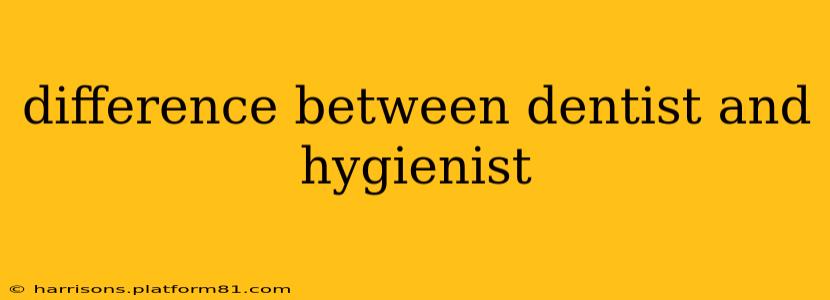Dentists and dental hygienists are both crucial members of a dental healthcare team, but their roles, training, and responsibilities differ significantly. Understanding these differences is vital for patients seeking optimal oral health. This comprehensive guide will clarify the distinctions between these two vital professions.
What Does a Dentist Do?
A dentist is a licensed medical professional who diagnoses, treats, and prevents diseases and conditions of the teeth, gums, and oral cavity. Their responsibilities encompass a broad range of procedures, including:
- Diagnosis and Treatment of Oral Diseases: Dentists diagnose and treat conditions like cavities, gum disease (gingivitis and periodontitis), oral cancer, and temporomandibular joint (TMJ) disorders.
- Restorative Dentistry: This involves repairing damaged teeth through fillings, crowns, bridges, and dentures.
- Cosmetic Dentistry: Dentists perform procedures to improve the appearance of teeth, such as teeth whitening, veneers, and orthodontics (in some cases).
- Oral Surgery: Some dentists specialize in oral surgery, performing procedures like tooth extractions and implant placement.
- Preventive Care: While hygienists play a large role here, dentists provide overall guidance on preventive care, including recommending brushing and flossing techniques and dietary advice.
- Managing Patient Records: Dentists are responsible for maintaining accurate and comprehensive patient records.
What Does a Dental Hygienist Do?
Dental hygienists are also licensed healthcare professionals, but their focus is primarily on preventative care and oral hygiene. Their duties include:
- Professional Teeth Cleaning: This involves removing plaque and tartar buildup from teeth, a crucial step in preventing gum disease and cavities.
- Oral Health Education: Hygienists educate patients on proper brushing and flossing techniques, dietary choices, and other habits that promote oral health.
- Applying Fluoride Treatments: Fluoride helps strengthen tooth enamel and protect against cavities.
- Taking X-rays: Hygienists often take dental X-rays to assist the dentist in diagnosis.
- Identifying Oral Health Problems: Hygienists can identify potential problems like gum disease or cavities and alert the dentist.
- Applying Sealants: These protect the chewing surfaces of molars from decay.
What is the Education and Training Difference?
The educational pathways for dentists and dental hygienists diverge significantly:
-
Dentist: Dentists must complete a four-year undergraduate degree followed by four years of dental school, earning a Doctor of Dental Surgery (DDS) or Doctor of Dental Medicine (DMD) degree. Many then pursue specialized training through residencies.
-
Dental Hygienist: Dental hygienists typically complete an associate's degree or a bachelor's degree in dental hygiene, followed by passing a licensing exam. The length of the program varies depending on the degree pursued.
Who Should You See For Specific Dental Needs?
The choice between seeing a dentist or a hygienist depends on your needs:
-
Routine Checkups and Cleanings: You should see a dental hygienist for regular checkups and professional cleanings. The dentist will then review the hygienist's findings.
-
Diagnosis and Treatment of Oral Diseases: For any suspected oral health problems, you must see a dentist for diagnosis and treatment.
-
Complex Dental Procedures: For more involved procedures like fillings, crowns, or oral surgery, you will need to see a dentist.
What are the Key Differences in a Nutshell?
| Feature | Dentist | Dental Hygienist |
|---|---|---|
| Education | DDS/DMD (8 years of post-secondary) | Associate's or Bachelor's Degree (2-4 years) |
| Primary Role | Diagnosis, treatment, and prevention | Preventative care and oral hygiene |
| Procedures | Wide range, including surgery | Cleanings, fluoride treatments, x-rays |
| Licensing | Licensed medical professional | Licensed healthcare professional |
By understanding the distinct roles and responsibilities of dentists and dental hygienists, patients can ensure they receive the appropriate level of care for their oral health needs. Both professionals play critical roles in maintaining optimal oral health, working together to provide comprehensive dental care.
